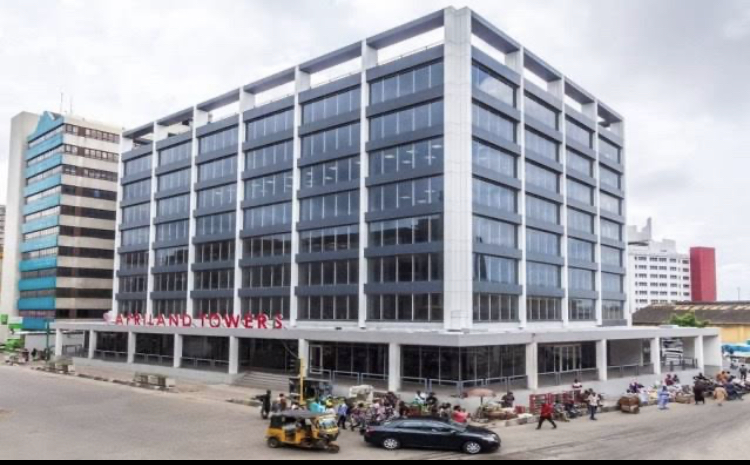Lagos, Nigeria — Chaos and panic erupted in Nigeria’s commercial capital yesterday as office workers jumped from the upper floors of Afriland Tower, a six-storey commercial building in the Marina district of Lagos Island, to escape a fast-moving fire. The dramatic scenes captured in videos now circulating widely on social media, showed men and women clinging to window ledges, some forced to leap several storeys to the ground while bystanders scrambled to catch them or deploy ladders.
The blaze, which broke out shortly after 1:20 p.m. local time, quickly engulfed parts of the high-rise that houses a branch of United Bank for Africa and several private offices. Witnesses said smoke poured from shattered windows within minutes, sending scores of workers racing to upper floors in search of fresh air.
Emergency authorities reported that the blaze began in an inverter room in the basement before rapidly spreading through stairwells and ventilation shafts.
Deputy Controller Paul Abraham of the Federal Fire Service confirmed that teams were dispatched immediately after receiving the alarm at 1:24 p.m. “Our swift response prevented further escalation,” he said, noting that crews remained on-site to assess the structural integrity of the building. Despite these assurances, many residents criticised the response as ineffective and slow, arguing that delays and inadequate preparedness contributed to the chaos and panic witnessed at Afriland Tower.
Read Also: Ekiti govt disproves Ojo N80m fire station donation claim
The latest incident has intensified scrutiny of Lagos’s emergency preparedness. Experts argue that, despite frequent warnings, the city, home to more than 20 million people, remains dangerously exposed to fire disasters. Congested roads often delay emergency vehicles, hydrants are scarce or dry, and many fire stations lack reliable equipment or sufficient personnel. Urban safety researcher Dr. Clement Ojo told The New Daily Prime that Lagos’s firefighting system “is fundamentally reactive rather than preventive, leaving buildings and occupants vulnerable.”
He added that inadequate enforcement of building safety codes is another critical problem. Many structures in Lagos, particularly in older commercial districts, have been altered without approval or constructed without sufficient fire exits, alarms, or sprinkler systems. When a blaze erupts, smoke and flames can spread unchecked. Yesterday’s incident mirrored other high-profile fires in markets and high-rises where rescue efforts were hampered by narrow access roads and limited water supply.
Public frustration has grown over what many perceive as the chronic underfunding of fire services. Budget allocations, critics say, often prioritise post-fire compensation rather than investing in prevention, training, and infrastructure. Studies comparing Nigerian cities have also highlighted weak institutional coordination between fire services, city planning authorities, and emergency agencies.
As investigators continue to assess the damage at Afriland Tower and confirm the number of injured, calls are mounting for a comprehensive overhaul of Lagos’s fire safety framework. Many Lagos residents and safety advocates are urging the government to enforce stricter codes, modernise equipment, invest in firefighter training, and expand the number of stations to underserved districts.
For those who leapt from windows yesterday, the fire was not just a workplace emergency but a stark reminder of the risks faced by residents in a rapidly growing megacity—where inadequate preparation can transform a routine day into a life-or-death scramble.



